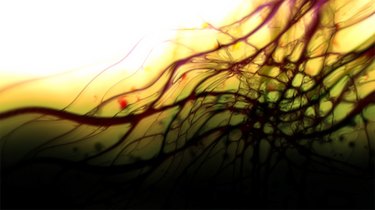Things You'll Need
Chlorine and pH tester
Liquid chlorine
Pool scrub brush
Textured sponge
Copper algaecide
Toothbrush

The presence of green algae in a pool is a normal occurrence for most pool owners through no fault of their own. Yellow algae, however, doesn't go away simply by adding algaecide or extra chlorine. In fact, yellow algae can withstand normal levels of pool chlorine, making it even more problematic. Stopping this type of algae from growing will take a combination of scrubbing, algaecide application and shock treatment.
Step 1
Gather any object that's recently been in the pool and place on the shallow end. Yellow algae can grow outside of the pool area. Scrub those objects with the sponge.
Video of the Day
Step 2
Brush all the pool surfaces thoroughly to include the pool's immediate perimeter. Use a toothbrush to reach smaller surfaces like the pool drain or waste lines.
Step 3
Test the pool for pH and chlorine levels. Add liquid chlorine until it reaches 10 ppm (parts per million) and the pH is 7.2. This is known as super-chlorinating or "shocking" the pool.
Step 4
Run your filter to backwash the waste. This should eliminate any visible yellow algae you just scrubbed.
Step 5
Add copper algaecide, which will target the unseen yellow algae spores. Purchase algaecide that targets yellow algae, although any other algaecide should help if it's not available.
Step 6
Repeat brushing 24 hours after you applied the algaecide. Shock the pool again as in step 3. Wait 24 hours and test the chlorine. If chlorine is between 1 and 3 ppm and yellow algae is no longer present, you are complete. Otherwise, repeat steps 2 through 4 and test again.
Video of the Day